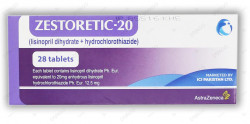Zestoretic (lisinopril/hydrochlorothiazide) Coupons, Discounts & Cost
Zestoretic is a combined antihypertensive drug (lisinopril in combination with hydrochlorothiazide). One way to save money on the Zestoretic retail cost regardless of income and insurance status is to use Zestoretic coupons or discount cards from RXCoupons. Use this Lisinopril/Hydrochlorothiazide coupon at this online pharmacy and receive up to 75% off the sale price.
What is Zestoretic
Zestoretic is a combined antihypertensive drug (lisinopril in combination with hydrochlorothiazide). It is used for the treatment of arterial hypertension.
Hydrochlorothiazide is an antihypertensive agent that improves plasma renin activity. Hydrochlorothiazide increases the excretion of sodium, potassium, magnesium, bicarbonates and water. Lisinopril and hydrochlorothiazide combination gives a greater reduction in blood pressure than monotherapy. Lisinopril reduces the excretion of potassium associated with hydrochlorothiazide.
When I should avoid using Zestoretic
The drug has a number of contraindications: severe renal and hepatic insufficiency, congenital angioedema, pregnancy and lactation, patients on hemodialysis, patients under 18 years of age, individual intolerance to the active substance.
The drug should be used with caution in patients with bronchial asthma, ischemic heart disease, gout, psoriasis, connective tissue diseases.
How I should take Zestoretic
Take 1 tablet once a day.
The highest daily dose is 1 tablet. The highest single dose is 1 tablet as well.
Zestoretic therapy is not recommended in the first trimester of pregnancy (alternative treatment should be started as soon as possible).
Zestoretic is contraindicated in the second and third trimesters of pregnancy. It is known that lisinopril has a toxic effect on the fetus (reduced kidney function) and newborns (kidney failure, hypotension, hyperkalemia). Hydrochlorothiazide can cause growth retardation in children. In addition, there are rare cases of hypoglycemia and thrombocytopenia in newborns.
Zestoretic is contraindicated during lactation. Both lisinopril and hydrochlorothiazide are excreted into the female milk. Both active substances can cause severe side effects in infants.
Different types of Zestoretic side effects
Side effects associated with hydrochlorothiazide
CNS: headache, dizziness, depression, sleep disorders, paresthesia.
Respiratory system: pneumonitis, pulmonary edema.
Hematopoietic system: thrombocytopenia, agranulocytosis, leukopenia, hemolytic anemia.
Cardiovascular system: orthostatic hypotension; rarely - arrhythmia.
Dermatological reactions: rash; rarely - toxic epidermal necrolysis.
Urinary system: glycosuria, hyperuricemia.
Reproductive system: impotence.
Side effects associated with lisinopril
CNS: headaches, dizziness, sleep disorders, paresthesia, confusion.
Respiratory system: dry cough, shortness of breath, sinusitis, bronchospasm.
Hematopoiesis: anemia, thrombocytopenia, agranulocytosis, pancytopenia.
Cardiovascular system: arterial hypotension, tachycardia; rarely - pain in the chest.
Digestive system: glossitis, vomiting, diarrhea, constipation; rarely - hepatitis, cholestatic jaundice, pancreatitis.
Musculoskeletal system: myalgia, muscle cramps.
Dermatological reactions: rash.
Urinary system: dysuria; rarely - acute renal failure.
Reproductive system: erectile dysfunction.
Other reactions: noise in the ears, blurred vision, allergic reactions.
What should I know about Zestoretic overdose?
Zestoretic therapy can lead to low blood pressure, bradycardia, cardiovascular shock, kidney failure.
Find medical information for Zestoretic interaction
Hydrochlorothiazide strengthens the effects of certain muscle relaxants.
Patients with diabetes mellitus should reduce the doses of oral hypoglycemic agents and insulin when using hydrochlorothiazide.
Hydrochlorothiazide can be used with caution with glucocorticosteroids, carbenoxolone, amphotericin, cardiac glycosides.
Anticholinergic drugs increase the bioavailability of hydrochlorothiazide.
Hydrochlorothiazide can cause hypercalcemia when used with vitamin D and calcium preparations.
Cyclosporine increases the risk of gout and hyperuricemia.
Lisinopril should be used with caution with insulin and oral hypoglycemic drugs.
Lisinopril enhances the toxic effects of lithium preparations.
Sodium chloride, non-steroidal anti-inflammatory drugs reduce the hypotensive effect of lisinopril.
Potassium-sparing diuretics and products with a high content of potassium can cause hyperkalemia.
Cytostatics, allopurinol, procainamide, immunosuppressants increase the risk of leukopenia.
Zestoretic special instructions
It is not recommended to drive when you take Zestoretic.
Lisinopril and hydrochlorothiazide combination is contraindicated in patients with severe renal disease.
Particular caution is required when prescribing Zestoretic for patients with coronary heart disease or cerebrovascular disease (long-term therapy can lead to myocardial infarction or stroke).
Zestoretic should be used with caution in patients with aortic stenosis, mitral stenosis, or hypertrophic cardiomyopathy.

